| Srl | Item |
| 1 |
ID:
044538
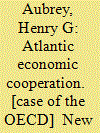

|
|
|
|
|
| Publication |
New York, Frederick A Praeger, 1967.
|
| Description |
x, 214p.
|
|
|
|
|
|
|
|
|
|
|
|
Copies: C:1/I:0,R:0,Q:0
Circulation
| Accession# | Call# | Current Location | Status | Policy | Location |
| 000280 | 341.2422/AUB 000280 | Main | On Shelf | General | |
|
|
|
|
| 2 |
ID:
006964
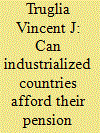

|
|
|
|
|
| Publication |
Summer 2000.
|
| Description |
201-212
|
|
|
|
|
|
|
|
|
|
|
|
|
|
|
|
| 3 |
ID:
072261
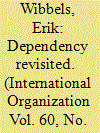

|
|
|
|
|
| Publication |
2006.
|
| Summary/Abstract |
While increased exposure to the global economy is associated with increased welfare effort in the Organization for Economic Cooperation and Development (OECD), the opposite holds in the developing world. These differences are typically explained with reference to domestic politics. Tradables, unions, and the like in the developing world are assumed to have less power or interests divergent to those in the OECD-interests that militate against social spending. I claim that such arguments can be complemented with a recognition that developed and developing nations have distinct patterns of integration into global markets. While income shocks associated with international markets are quite modest in the OECD, they are profound in developing nations. In the OECD, governments can respond to those shocks by borrowing on capital markets and spending countercyclically on social programs. No such opportunity exists for most governments in the developing world, most of which have limited access to capital markets in tough times, more significant incentives to balance budgets, and as a result cut social spending at the times it is most needed. Thus, while internationally inspired volatility and income shocks seem not to threaten the underpinnings of the welfare state in rich nations, it undercuts the capacity of governments in the developing world to smooth consumption (and particularly consumption by the poor) across the business cycle.
|
|
|
|
|
|
|
|
|
|
|
|
|
|
|
|
| 4 |
ID:
043247
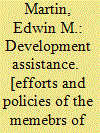

|
|
|
|
|
| Publication |
Paris, Organisation for economic cooperation and development, 1970.
|
| Description |
211p.
|
|
|
|
|
|
|
|
|
|
|
|
Copies: C:1/I:0,R:0,Q:0
Circulation
| Accession# | Call# | Current Location | Status | Policy | Location |
| 007063 | 338.91401724/OECD 007063 | Main | On Shelf | General | |
|
|
|
|
| 5 |
ID:
142689
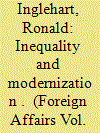

|
|
|
|
|
| Summary/Abstract |
During the past century, economic inequality in the developed world has traced a massive U-shaped curve—starting high, curving downward, then curving sharply back up again. In 1915, the richest one percent of Americans earned roughly 18 percent of all national income. Their share plummeted in the 1930s and remained below ten percent through the 1970s, but by 2007, it had risen to 24 percent. Looking at household wealth rather than income, the rise of inequality has been even greater, with the share owned by the top 0.1 percent increasing to 22 percent from nine percent three decades ago. In 2011, the top one percent of U.S. households controlled 40 percent of the nation’s entire wealth. And while the U.S. case may be extreme, it is far from unique: all but a few of the countries of the Organization for Economic Cooperation and Development for which data are available experienced rising income inequality (before taxes and transfers) during the period from 1980 to 2009.
|
|
|
|
|
|
|
|
|
|
|
|
|
|
|
|
| 6 |
ID:
170874
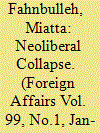

|
|
|
| 7 |
ID:
019227
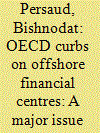

|
|
|
|
|
| Publication |
April 2001.
|
| Description |
199-211
|
| Summary/Abstract |
Of 35 countries identified as tax havens by the Organization for Economic Cooperation and Development, 26 are members of the Commonwealth. States which fail to revise policies identified as harmful by July 2001 will face concerted defensive action by OECD member states and other countries. Commonwealth Finance Ministers have sought to mitigate the effects of the policy on affected member states but it is not yet clear how successful its intervention has been. The OECD's policy of 'naming and shaming' of countries, many of them small and weak with limited economic opportunities, raises legal and ethical questions, and could destroy the rationale for offshore financial centres.
|
|
|
|
|
|
|
|
|
|
|
|
|
|
|
|
| 8 |
ID:
051914
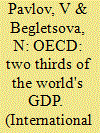

|
|
|